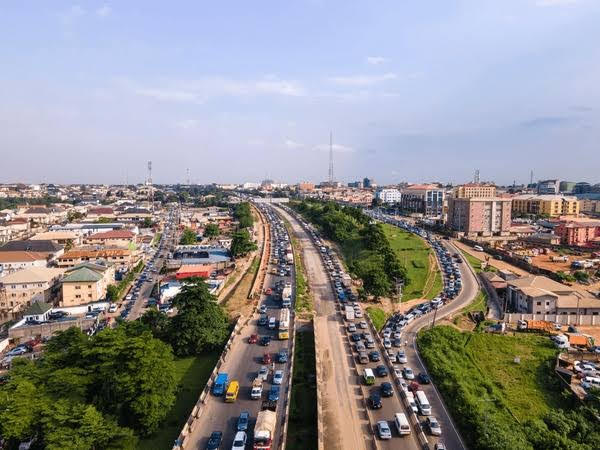The Lekki Epe Expressway, initially constructed as a dual carriageway, has struggled to keep pace with the escalating demand
By Dennis Isong
Over the years, Lekki has been blessed with exponential growth and development. However, this has brought about a significant challenge – the congestion and gridlock that plague the area’s main thoroughfare. The Lekki-Epe Expressway, a crucial artery connecting the Lekki Peninsula to the rest of Lagos, has become a daily nightmare for commuters, grappling with endless traffic jams and frustrating delays.
At the heart of this issue lies a confluence of factors that have contributed to the road’s increasing strain. The explosive growth in residential and commercial development along the corridor has led to a dramatic increase in the number of vehicles plying the route, far exceeding the road’s original design capacity. Additionally, the lack of efficient public transportation options has forced more people to rely on private cars, further exacerbating the problem.
Read Also: The Lekki Peninsula: How restaurants and bars are shaping Lagos real estate
Compounding the situation is the inadequate infrastructure to accommodate the growing traffic flow. The Lekki-Epe Expressway, initially constructed as a dual carriageway, has struggled to keep pace with the escalating demand. Bottlenecks, such as the absence of sufficient entry and exit points, as well as the lack of well-planned intersections and interchanges, have created choke points that grind traffic to a halt during peak hours.
The consequences of this situation are far-reaching, impacting both the economic and social fabric of the Lekki community. Businesses in the area have reported significant losses due to the disruption in supply chains and the difficulty in accessing their premises. Employees face the daunting prospect of spending hours commuting, sacrificing precious time that could be spent with their families or pursuing personal endeavors. The environmental impact is also significant, with idling vehicles contributing to increased air pollution and greenhouse gas emissions.
To address these challenges and pave the way for a more sustainable and efficient transportation system, a multifaceted approach is required. Firstly, the Lagos State Government must prioritize the expansion and upgrade of the Lekki-Epe Expressway. This would involve the construction of additional lanes, the implementation of well-designed interchanges, and the optimization of entry and exit points. By increasing the road’s capacity, the flow of traffic can be better managed, reducing the frequency and duration of gridlocks.
Simultaneously, the government should invest in the development of a robust public transportation network. The introduction of a dedicated bus rapid transit (BRT) system along the Lekki-Epe Corridor, complemented by a network of feeder routes, would provide a reliable and efficient alternative to private vehicles. This would not only alleviate the burden on the road infrastructure but also promote a more environmentally-friendly mode of transportation.
To encourage the use of public transport, the government should consider implementing a comprehensive parking management strategy. This could include the introduction of paid parking zones, the establishment of park-and-ride facilities, and the enforcement of strict regulations on on-street parking. By making it less convenient and more costly to use private vehicles, commuters would be incentivized to opt for the more efficient and sustainable public transportation options.
Furthermore, the government should explore the implementation of intelligent transportation systems (ITS) to better manage the flow of traffic. This could include the installation of electronic toll collection systems, the implementation of advanced traffic signal coordination, and the deployment of real-time traffic monitoring and information dissemination platforms. By leveraging technology, the efficiency of the road network can be significantly improved, reducing travel times and minimizing the impact of congestion.
In addition to infrastructure and policy interventions, the government should also engage in targeted public awareness campaigns to promote sustainable mobility practices. This could involve educating the public on the benefits of public transportation, carpooling, and the use of non-motorized modes of transport, such as cycling and walking. By fostering a shift in the public’s mindset, the demand for private vehicle usage can be gradually reduced, leading to a more sustainable transportation ecosystem.
To ensure the success of these initiatives, the Lagos State Government must also collaborate with key stakeholders, including urban planners, transportation experts, and community representatives. This collaborative approach will help to ensure that the proposed solutions are tailored to the specific needs and challenges of the Lekki community, and that they are implemented in a manner that balances the interests of all affected parties.
Moreover, the government should explore innovative financing mechanisms to fund the necessary infrastructure upgrades and public transportation initiatives. This could include the utilization of public-private partnerships, the introduction of congestion pricing schemes, and the allocation of dedicated funding from the state and federal budgets. By securing the necessary financial resources, the government can ensure the long-term sustainability and effectiveness of the proposed solutions.
As the Lekki community continues to grow and evolve, the issue of road congestion and traffic management will only become more pressing. However, with a comprehensive and strategic approach, the challenges can be transformed into opportunities for the development of a modern, efficient, and sustainable transportation system. By addressing the root causes of the problem and implementing a holistic set of solutions, the Lekki-Epe Expressway can be transformed into a model of urban mobility, serving as a blueprint for other rapidly growing cities in Nigeria and beyond.







